
The Federal Government plans to spend about two trillion naira in the Niger Delta between now and 2021. This was disclosed by the Minister of State for Petroleum Resources, Dr. Ibe Kachikwu.
Speaking through his Technical Adviser on Niger Delta Affairs, Mr. Charles Achodo, Kachikwu said that the ‘amount covers what the oil companies’ and ‘government’s agencies are putting into the region and all kinds of investments that is required in that region.’
Coming in the twilight of this administration’s first tenure, this announcement is suspect. It smells foul. It smirks more of a re-election gimmick than a well thought-out policy or plan.
In the early days of this administration this newspaper called on the then newly-elected President to develop a new master plan for the beleaguered Niger Delta with a view to having a definitive and defining trajectory for the people of the region. Sadly, those calls fell on deaf ears.
Three years into his tenure President Buhari has not produced an action plan for the proverbial goose that lays the golden egg and has not even visited the region as recommended to show empathy and identify with the people.
In what can now pass as the singsong of this government, Kachikwu blamed the people of the region who have reportedly collected 11,000 contracts with nothing to show for it.
He also blamed leaders of the region for ‘becoming a cacophony of voices but without a purpose’ and ‘a cacophony of all kinds of projects.’
Certainly, the people and the indigenous leaders of the Niger Delta share in the blame for the state of the region but what exactly shapes the mindset of public officials in this country that makes them turn around to blame the people for failed leadership, for their own ineptitude?
What accounts for this insulting impudence and offensive temerity?
The Niger Delta has become a pipe for frittering away state funds in the guise of development.
Such bodies as Oil Mineral Producing Areas Development Commission (OMPADEC), Niger Delta Development Commission (NDDC), Ministry of Niger Delta Affairs and the Amnesty Programme among others had been set up in the past to address the lingering pain of underdevelopment in the oil-bearing region.
Tragically, because there was no concise and defined approach to development, all such resources seem to have ended up in the pockets of Federal and State Government officials, both from and outside the region.
There has to be a real plan for the Niger Delta. Its rivers, creeks, villages, and towns need to be interconnected to improve movement possibilities. The region needs bridges and roads to achieve this.
The headquarters of the international oil companies should be re-located to the region. Since Shell moved from Warri, that once thriving oil-city of international fame has become a shell of its old self.
The rail system which currently accommodates only Port-Harcourt and Calabar should be extended to Warri, Benin and Sapele.
The deep sea ports in the region – Port Harcourt, Sapele, Calabar, Warri and Koko – should be reactivated as a form of serious action.
The Lagos port is currently congested, yet no plan has been put in place to divert ships to these natural ports.
Power supply should be steady, since gas from the region is used to power generating plants across the country.
END

Be the first to comment